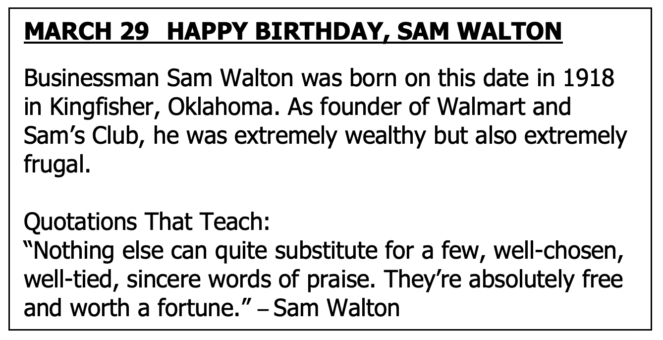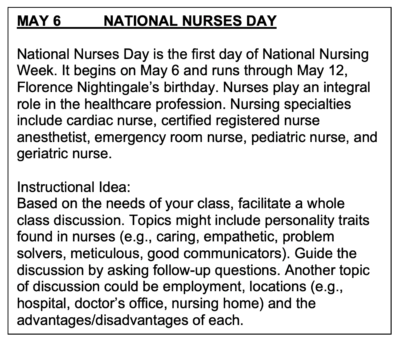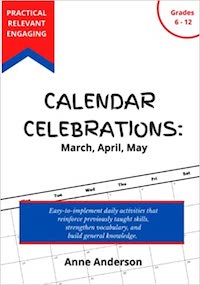Good Morning Haiku From the Cat
In the morning light,
You sleep despite my meow.
I stand on your face.
by MiddleWeb · Published · Updated
By Anne Anderson
 I’m back to help you celebrate learning every day with more quirky Calendar Celebrations!
I’m back to help you celebrate learning every day with more quirky Calendar Celebrations!
Remember, middle school students love knowing something nobody else knows, and they especially love the weird stuff! Use that to your advantage to build their general knowledge base, strengthen vocabulary, and reinforce previously taught skills.
March is filled with celebrations: American Red Cross Month, Women’s History Month, March Madness, and National Optimism Month. The Iditarod Trail Sled Dog Race begins on the first Saturday of March, Absolutely Incredible Kid Day is the third Thursday, and Manatee Appreciation Day on the fourth Wednesday. There’s something for everyone!
Dazzle your students with your immense storehouse of knowledge. National Potato Chip Day is an example of a “Throw-n-Go” day. Throw out a tidbit of information, pause, and then move ahead with the lesson or activity.

Me: What are you doing? Are you eating in class?
Willie: Well, yes, I was still hungry . . . and I had some crisps left from lunch . . . and I wanted to finish them.
Me: Put your crisps away. Now. Thank you.
That’s when I knew that the forty-five seconds I spent on National Potato Chip Day were worth it—at least, for one student!
Some days, the celebration has more substance and may take longer, as in Sam Walton’s birthday. This event includes an opportunity to strengthen and/or build vocabulary along with the possibility of a writing activity.
A benefit of the suggested activities in Calendar Celebrations is their versatility as shown here.

Then pose the following question to the class: Is being frugal a bad thing? Ask follow-up questions that lead your students to discover the meaning of frugal.
Your exit slip for March 29 might include Mr. Walton’s quotation. And, to make this activity more powerful, invite students to use the words wealthy and frugal in their responses.
But what happens if you run out of time in 2nd hour and don’t get to the exit slip? Nothing. You can always use it on another day! Or you can just omit it. Weeks later when you are revisiting connotation and denotation for the umpteenth time, remember to ask: would you rather be called frugal or a tight wad?
You choose what to use. You do not have to do everything with every class. With spring fever and testing interrupting schedules, it is okay if you don’t do the same thing with every class.

Jazz Appreciation Month celebrates the heritage and history of this music genre. Start the month off by playing a jazz selection as students enter the classroom. Some of the greats in jazz have birthdays in April: Billie Holiday (7th), Ella Fitzgerald (25th), and Duke Ellington (29th).
National Poetry Month celebrates poets and their poetry. Langston Hughes’ poetry is connected to jazz music. When spoken aloud, the rhythm of his short poem If-ing sounds like jazz! Share it with your students (you may have to explain what a Packard is!). April 17 is National Haiku Day which affords numerous instructional possibilities using examples of these brief, fun-to-write poems.
Good Morning Haiku From the Cat
In the morning light,
You sleep despite my meow.
I stand on your face.
Mathematics Education Month celebrates the understanding and appreciation of mathematics. What better way to celebrate math than with Kathi Appelt’s poem “Dreaming in Haiku” from her book Poems from Homeroom. Here is a list of poetry resources related to school and math.
What’s on the calendar in May? Get Caught Reading Month, National Bike Month, National Pet Month, and Asthma & Allergy Awareness Month. The second Sunday is Mother’s Day and the last Monday is Memorial Day. Birthdays in May include Christopher Paul Curtis (10th), Stevie Wonder (13th), George Lucas (14th), Gary Paulsen (17th), Bill “Bojangles” Robinson (25th), Sally Ride (26th), and John F. Kennedy (29th).
Encourage your colleagues to celebrate May 3.

Address Speaking and Listening standards along with career options with this event.

As spring fever begins to run rampart through your building, be prepared with some unusual celebrations to help reinforce previously taught material, build and reinforce vocabulary, and broaden general knowledge. Paper Airplane Day (May 26) may be just what you need to survive the end of this school year!

Calendar Celebrations: March, April, May is the third book in Anne Anderson’s series on resources for months of the year. (She wrote about the first one here and the second one here.) Anne has also published articles in IDEAS Plus and Voices from the Middle, publications of the National Council of Teachers of English. She is a frequent reviewer of professional books for MiddleWeb.com.
Tags: Anne AndersonAprilknowledge baseMarchMaymiddle gradesskillsspring calendarvocabulary
MiddleWeb
MiddleWeb is all about the middle grades, with great 4-8 resources, book reviews, and guest posts by educators who support the success of young adolescents. And be sure to subscribe to MiddleWeb SmartBrief for the latest middle grades news & commentary from around the USA.
More